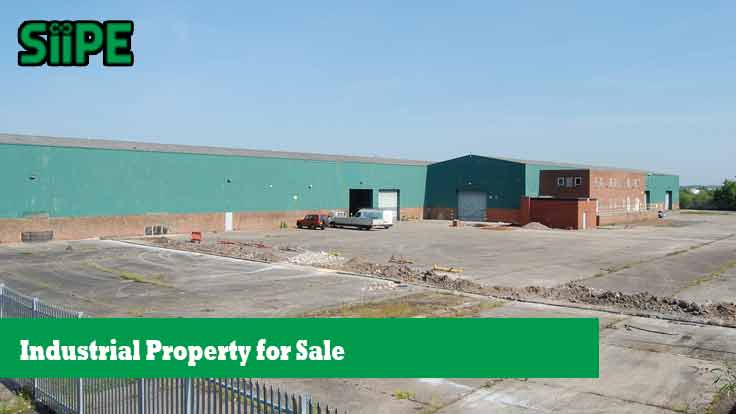The demand for industrial property has been steadily increasing, driven by the rise of e-commerce, manufacturing expansion, and logistics growth. Whether you are an investor looking for long-term rental income or a company aiming to expand operations, understanding the nuances of industrial property for sale is crucial. This guide will walk you through the fundamentals, market trends, and essential tips to help you make an informed decision.
What Is Industrial Property?
Industrial property refers to real estate specifically designed and zoned for industrial activities, such as:
-
Manufacturing facilities – Factories for large-scale production.
-
Warehouses and distribution centers – Storage and logistics hubs.
-
Flex spaces – A combination of office and light industrial use.
These properties differ from residential and commercial buildings due to their size, structure, and location requirements.
Why Invest in Industrial Property?
Industrial real estate offers several benefits:
-
High Demand – Growing need for warehouses due to e-commerce.
-
Long-Term Leases – Many tenants commit to multi-year contracts.
-
Stable Cash Flow – Predictable rental income.
-
Capital Appreciation – Property value often increases over time.
Key Factors to Consider Before Buying
1. Location and Accessibility
Location is the most critical factor in determining the success of an industrial property investment. A strategically located property can significantly reduce transportation costs, improve supply chain efficiency, and attract high-quality tenants. For example, properties near major highways, seaports, or rail freight terminals enable faster delivery times, which is a major advantage for logistics and distribution companies.
Accessibility is equally important. Industrial tenants often need to accommodate large trucks, trailers, and heavy machinery. This means the property should have well-designed access roads, wide turning areas, and sufficient parking spaces for commercial vehicles. Additionally, being close to urban centers or skilled labor markets can increase the property’s appeal to manufacturers and service providers.
2. Zoning and Compliance
Before purchasing an industrial property, it’s essential to confirm that the site is appropriately zoned for your intended use. Industrial zoning regulations vary by region and may dictate the types of activities allowed on the premises. For instance, some areas may only allow light manufacturing, while others permit heavy industrial operations.
Compliance with environmental regulations is also a key consideration. Many industrial activities generate waste, noise, or emissions that are subject to government oversight. Failing to comply with these regulations can result in fines, operational restrictions, or even closure of the facility. Investors should conduct thorough due diligence, including environmental site assessments, to avoid costly surprises after purchase.
3. Property Size and Layout
The size and layout of an industrial property can directly influence its usability and future value. A property with ample floor space allows for flexible operations, such as adding assembly lines, expanding storage capacity, or incorporating new machinery.
Ceiling height is another critical element, especially for warehousing and manufacturing facilities. Higher ceilings allow for vertical storage systems and the use of cranes or other overhead equipment, increasing operational efficiency. The layout should also include well-positioned loading docks, clear internal traffic flow for forklifts, and designated areas for offices, restrooms, and break rooms. A thoughtfully designed space not only improves tenant satisfaction but also enhances long-term rental prospects.
4. Infrastructure and Utilities
Industrial operations typically require more robust infrastructure and utilities than commercial or residential properties. For example, manufacturing plants may need a high-capacity electrical supply, reinforced flooring to support heavy equipment, and specialized ventilation systems to manage dust or fumes.
Water supply and waste management systems are equally important. Facilities that use water for cooling, cleaning, or production processes must have reliable access to clean water sources. At the same time, waste disposal systems—whether for solid waste, wastewater, or hazardous materials—must meet environmental standards.
Connectivity is another growing consideration. Many modern industrial tenants depend on high-speed internet and digital infrastructure for automation, tracking, and communication systems. A property with inadequate infrastructure may require costly upgrades before it can attract top-tier tenants.
5. Tenant Profile
When buying an industrial property that already has tenants, understanding the tenant profile is crucial. A financially stable tenant with a strong industry reputation can ensure consistent rental income and reduce the risk of vacancies. Review the tenant’s business performance, creditworthiness, and industry outlook before finalizing the purchase.
The terms of the lease should also be carefully examined. Long-term leases with favorable renewal clauses provide stability, while short-term leases may allow for higher rent adjustments but carry the risk of turnover. Additionally, consider whether the tenant’s activities align with the property’s specifications. For example, a light manufacturing tenant might not fully utilize a heavy industrial facility, which could affect future leasing opportunities.
Current Market Trends
-
E-commerce Boom – Rapid growth in online retail is pushing demand for warehouses.
-
Sustainability Focus – Green building designs and renewable energy integration are becoming essential.
-
Smart Technology – IoT devices for inventory tracking and automation in warehouses.
Financing Options for Industrial Property
-
Traditional Bank Loans – Suitable for established businesses and investors.
-
Commercial Mortgages – Designed for income-generating properties.
-
REITs (Real Estate Investment Trusts) – Indirect investment option for portfolio diversification.
Risks in Industrial Property Investment
While promising, industrial property investment comes with risks:
-
Market fluctuations
-
Tenant default
-
High maintenance costs
-
Regulatory changes
Proper due diligence and risk mitigation strategies are essential.
Tips for Successful Industrial Property Investment
-
Partner with an experienced commercial real estate agent.
-
Conduct thorough property inspections.
-
Research market rental rates.
-
Plan for long-term maintenance and upgrades.
Industrial property for sale presents a lucrative opportunity for investors and businesses. By considering location, compliance, market trends, and financing options, you can make a well-informed decision that maximizes returns while minimizing risks.










